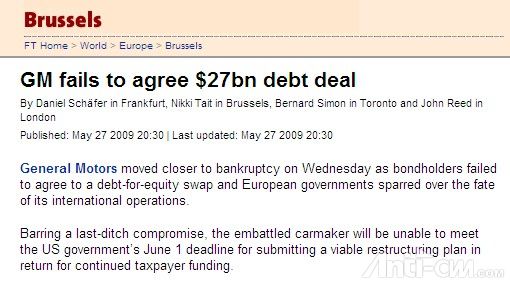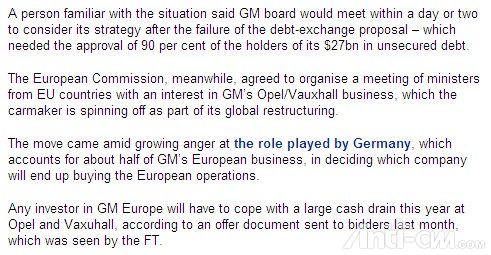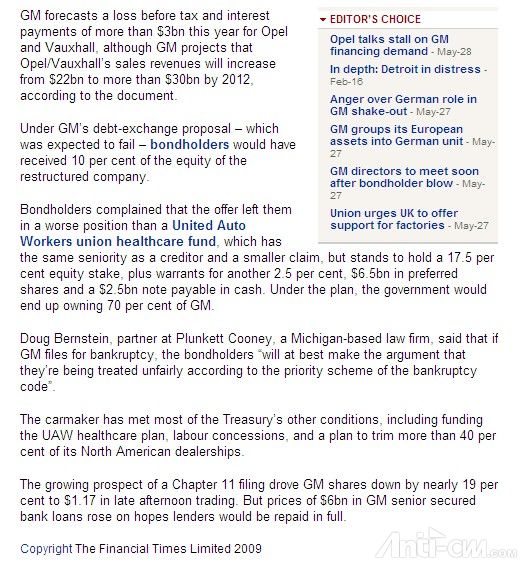|
|
GM fails to agree $27bn debt deal
http://www.ft.com/cms/s/0/6c675432-4af3-11de-87c2-00144feabdc0,dwp_uuid=70662e7c-3027-11da-ba9f-00000e2511c8.html
By Daniel Schäfer in Frankfurt, Nikki Tait in Brussels, Bernard Simon in Toronto and John Reed in London
Published: May 27 2009 20:30 | Last updated: May 27 2009 20:30

General Motors moved closer to bankruptcy on Wednesday as bondholders failed to agree to a debt-for-equity swap and European governments sparred over the fate of its international operations.
Barring a last-ditch compromise, the embattled carmaker will be unable to meet the US government’s June 1 deadline for submitting a viable restructuring plan in return for continued taxpayer funding.
A person familiar with the situation said GM board would meet within a day or two to consider its strategy after the failure of the debt-exchange proposal – which needed the approval of 90 per cent of the holders of its $27bn in unsecured debt.
The European Commission, meanwhile, agreed to organise a meeting of ministers from EU countries with an interest in GM’s Opel/Vauxhall business, which the carmaker is spinning off as part of its global restructuring.
The move came amid growing anger at the role played by Germany, which accounts for about half of GM’s European business, in deciding which company will end up buying the European operations.
Any investor in GM Europe will have to cope with a large cash drain this year at Opel and Vaxuhall, according to an offer document sent to bidders last month, which was seen by the FT.
GM forecasts a loss before tax and interest payments of more than $3bn this year for Opel and Vauxhall, although GM projects that Opel/Vauxhall’s sales revenues will increase from $22bn to more than $30bn by 2012, according to the document.
Under GM’s debt-exchange proposal – which was expected to fail – bondholders would have received 10 per cent of the equity of the restructured company.
Bondholders complained that the offer left them in a worse position than a United Auto Workers union healthcare fund, which has the same seniority as a creditor and a smaller claim, but stands to hold a 17.5 per cent equity stake, plus warrants for another 2.5 per cent, $6.5bn in preferred shares and a $2.5bn note payable in cash. Under the plan, the government would end up owning 70 per cent of GM.
Doug Bernstein, partner at Plunkett Cooney, a Michigan-based law firm, said that if GM files for bankruptcy, the bondholders “will at best make the argument that they’re being treated unfairly according to the priority scheme of the bankruptcy code”.
The carmaker has met most of the Treasury’s other conditions, including funding the UAW healthcare plan, labour concessions, and a plan to trim more than 40 per cent of its North American dealerships.
The growing prospect of a Chapter 11 filing drove GM shares down by nearly 19 per cent to $1.17 in late afternoon trading. But prices of $6bn in GM senior secured bank loans rose on hopes lenders would be repaid in full.



|
agree, deal, Debt, fails, agree, deal, Debt, fails, agree, deal, Debt, fails, 金融时报
|